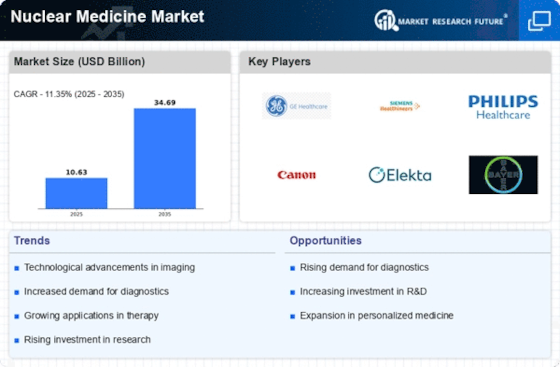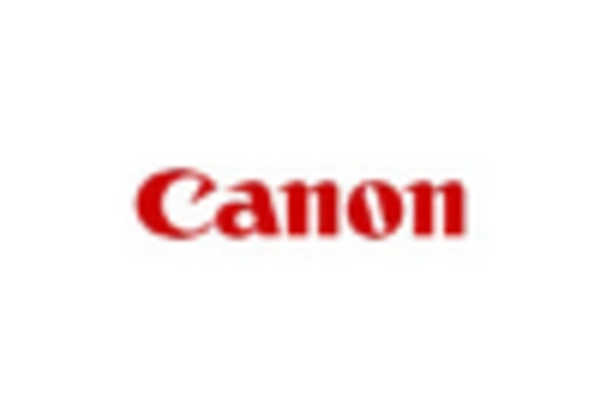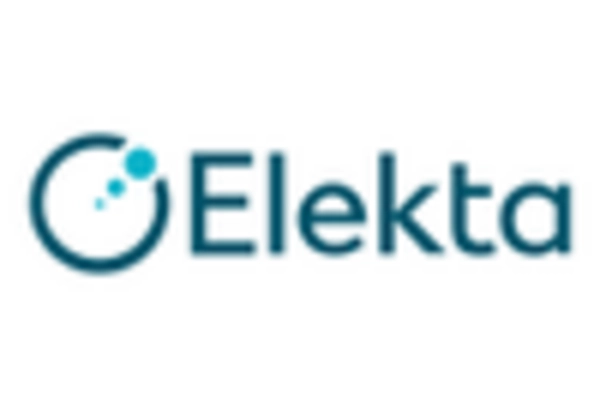Diagnostic Imaging
Therapeutic Applications
Radiopharmaceutical Production
Research Applications
Technetium-99m
Iodine-131
Fluorine-18
Yttrium-90
Hospitals
Diagnostic Imaging Centers
Academic Research Institutions
Pharmaceutical Companies
Positron Emission Tomography
Single-Photon Emission Computed Tomography
Radiotherapy
Brachytherapy
North America
Europe
South America
Asia Pacific
Middle East and Africa
North America Outlook (USD Billion, 2019-2035)
North America Nuclear Medicine Market by Application Type
Diagnostic Imaging
Therapeutic Applications
Radiopharmaceutical Production
Research Applications
North America Nuclear Medicine Market by Radioisotope Type
Technetium-99m
Iodine-131
Fluorine-18
Yttrium-90
North America Nuclear Medicine Market by End User Type
Hospitals
Diagnostic Imaging Centers
Academic Research Institutions
Pharmaceutical Companies
North America Nuclear Medicine Market by Procedure Type
Positron Emission Tomography
Single-Photon Emission Computed Tomography
Radiotherapy
Brachytherapy
North America Nuclear Medicine Market by Regional Type
US
Canada
US Outlook (USD Billion, 2019-2035)
US Nuclear Medicine Market by Application Type
Diagnostic Imaging
Therapeutic Applications
Radiopharmaceutical Production
Research Applications
US Nuclear Medicine Market by Radioisotope Type
Technetium-99m
Iodine-131
Fluorine-18
Yttrium-90
US Nuclear Medicine Market by End User Type
Hospitals
Diagnostic Imaging Centers
Academic Research Institutions
Pharmaceutical Companies
US Nuclear Medicine Market by Procedure Type
Positron Emission Tomography
Single-Photon Emission Computed Tomography
Radiotherapy
Brachytherapy
CANADA Outlook (USD Billion, 2019-2035)
CANADA Nuclear Medicine Market by Application Type
Diagnostic Imaging
Therapeutic Applications
Radiopharmaceutical Production
Research Applications
CANADA Nuclear Medicine Market by Radioisotope Type
Technetium-99m
Iodine-131
Fluorine-18
Yttrium-90
CANADA Nuclear Medicine Market by End User Type
Hospitals
Diagnostic Imaging Centers
Academic Research Institutions
Pharmaceutical Companies
CANADA Nuclear Medicine Market by Procedure Type
Positron Emission Tomography
Single-Photon Emission Computed Tomography
Radiotherapy
Brachytherapy
Europe Outlook (USD Billion, 2019-2035)
Europe Nuclear Medicine Market by Application Type
Diagnostic Imaging
Therapeutic Applications
Radiopharmaceutical Production
Research Applications
Europe Nuclear Medicine Market by Radioisotope Type
Technetium-99m
Iodine-131
Fluorine-18
Yttrium-90
Europe Nuclear Medicine Market by End User Type
Hospitals
Diagnostic Imaging Centers
Academic Research Institutions
Pharmaceutical Companies
Europe Nuclear Medicine Market by Procedure Type
Positron Emission Tomography
Single-Photon Emission Computed Tomography
Radiotherapy
Brachytherapy
Europe Nuclear Medicine Market by Regional Type
Germany
UK
France
Russia
Italy
Spain
Rest of Europe
GERMANY Outlook (USD Billion, 2019-2035)
GERMANY Nuclear Medicine Market by Application Type
Diagnostic Imaging
Therapeutic Applications
Radiopharmaceutical Production
Research Applications
GERMANY Nuclear Medicine Market by Radioisotope Type
Technetium-99m
Iodine-131
Fluorine-18
Yttrium-90
GERMANY Nuclear Medicine Market by End User Type
Hospitals
Diagnostic Imaging Centers
Academic Research Institutions
Pharmaceutical Companies
GERMANY Nuclear Medicine Market by Procedure Type
Positron Emission Tomography
Single-Photon Emission Computed Tomography
Radiotherapy
Brachytherapy
UK Outlook (USD Billion, 2019-2035)
UK Nuclear Medicine Market by Application Type
Diagnostic Imaging
Therapeutic Applications
Radiopharmaceutical Production
Research Applications
UK Nuclear Medicine Market by Radioisotope Type
Technetium-99m
Iodine-131
Fluorine-18
Yttrium-90
UK Nuclear Medicine Market by End User Type
Hospitals
Diagnostic Imaging Centers
Academic Research Institutions
Pharmaceutical Companies
UK Nuclear Medicine Market by Procedure Type
Positron Emission Tomography
Single-Photon Emission Computed Tomography
Radiotherapy
Brachytherapy
FRANCE Outlook (USD Billion, 2019-2035)
FRANCE Nuclear Medicine Market by Application Type
Diagnostic Imaging
Therapeutic Applications
Radiopharmaceutical Production
Research Applications
FRANCE Nuclear Medicine Market by Radioisotope Type
Technetium-99m
Iodine-131
Fluorine-18
Yttrium-90
FRANCE Nuclear Medicine Market by End User Type
Hospitals
Diagnostic Imaging Centers
Academic Research Institutions
Pharmaceutical Companies
FRANCE Nuclear Medicine Market by Procedure Type
Positron Emission Tomography
Single-Photon Emission Computed Tomography
Radiotherapy
Brachytherapy
RUSSIA Outlook (USD Billion, 2019-2035)
RUSSIA Nuclear Medicine Market by Application Type
Diagnostic Imaging
Therapeutic Applications
Radiopharmaceutical Production
Research Applications
RUSSIA Nuclear Medicine Market by Radioisotope Type
Technetium-99m
Iodine-131
Fluorine-18
Yttrium-90
RUSSIA Nuclear Medicine Market by End User Type
Hospitals
Diagnostic Imaging Centers
Academic Research Institutions
Pharmaceutical Companies
RUSSIA Nuclear Medicine Market by Procedure Type
Positron Emission Tomography
Single-Photon Emission Computed Tomography
Radiotherapy
Brachytherapy
ITALY Outlook (USD Billion, 2019-2035)
ITALY Nuclear Medicine Market by Application Type
Diagnostic Imaging
Therapeutic Applications
Radiopharmaceutical Production
Research Applications
ITALY Nuclear Medicine Market by Radioisotope Type
Technetium-99m
Iodine-131
Fluorine-18
Yttrium-90
ITALY Nuclear Medicine Market by End User Type
Hospitals
Diagnostic Imaging Centers
Academic Research Institutions
Pharmaceutical Companies
ITALY Nuclear Medicine Market by Procedure Type
Positron Emission Tomography
Single-Photon Emission Computed Tomography
Radiotherapy
Brachytherapy
SPAIN Outlook (USD Billion, 2019-2035)
SPAIN Nuclear Medicine Market by Application Type
Diagnostic Imaging
Therapeutic Applications
Radiopharmaceutical Production
Research Applications
SPAIN Nuclear Medicine Market by Radioisotope Type
Technetium-99m
Iodine-131
Fluorine-18
Yttrium-90
SPAIN Nuclear Medicine Market by End User Type
Hospitals
Diagnostic Imaging Centers
Academic Research Institutions
Pharmaceutical Companies
SPAIN Nuclear Medicine Market by Procedure Type
Positron Emission Tomography
Single-Photon Emission Computed Tomography
Radiotherapy
Brachytherapy
REST OF EUROPE Outlook (USD Billion, 2019-2035)
REST OF EUROPE Nuclear Medicine Market by Application Type
Diagnostic Imaging
Therapeutic Applications
Radiopharmaceutical Production
Research Applications
REST OF EUROPE Nuclear Medicine Market by Radioisotope Type
Technetium-99m
Iodine-131
Fluorine-18
Yttrium-90
REST OF EUROPE Nuclear Medicine Market by End User Type
Hospitals
Diagnostic Imaging Centers
Academic Research Institutions
Pharmaceutical Companies
REST OF EUROPE Nuclear Medicine Market by Procedure Type
Positron Emission Tomography
Single-Photon Emission Computed Tomography
Radiotherapy
Brachytherapy
APAC Outlook (USD Billion, 2019-2035)
APAC Nuclear Medicine Market by Application Type
Diagnostic Imaging
Therapeutic Applications
Radiopharmaceutical Production
Research Applications
APAC Nuclear Medicine Market by Radioisotope Type
Technetium-99m
Iodine-131
Fluorine-18
Yttrium-90
APAC Nuclear Medicine Market by End User Type
Hospitals
Diagnostic Imaging Centers
Academic Research Institutions
Pharmaceutical Companies
APAC Nuclear Medicine Market by Procedure Type
Positron Emission Tomography
Single-Photon Emission Computed Tomography
Radiotherapy
Brachytherapy
APAC Nuclear Medicine Market by Regional Type
China
India
Japan
South Korea
Malaysia
Thailand
Indonesia
Rest of APAC
CHINA Outlook (USD Billion, 2019-2035)
CHINA Nuclear Medicine Market by Application Type
Diagnostic Imaging
Therapeutic Applications
Radiopharmaceutical Production
Research Applications
CHINA Nuclear Medicine Market by Radioisotope Type
Technetium-99m
Iodine-131
Fluorine-18
Yttrium-90
CHINA Nuclear Medicine Market by End User Type
Hospitals
Diagnostic Imaging Centers
Academic Research Institutions
Pharmaceutical Companies
CHINA Nuclear Medicine Market by Procedure Type
Positron Emission Tomography
Single-Photon Emission Computed Tomography
Radiotherapy
Brachytherapy
INDIA Outlook (USD Billion, 2019-2035)
INDIA Nuclear Medicine Market by Application Type
Diagnostic Imaging
Therapeutic Applications
Radiopharmaceutical Production
Research Applications
INDIA Nuclear Medicine Market by Radioisotope Type
Technetium-99m
Iodine-131
Fluorine-18
Yttrium-90
INDIA Nuclear Medicine Market by End User Type
Hospitals
Diagnostic Imaging Centers
Academic Research Institutions
Pharmaceutical Companies
INDIA Nuclear Medicine Market by Procedure Type
Positron Emission Tomography
Single-Photon Emission Computed Tomography
Radiotherapy
Brachytherapy
JAPAN Outlook (USD Billion, 2019-2035)
JAPAN Nuclear Medicine Market by Application Type
Diagnostic Imaging
Therapeutic Applications
Radiopharmaceutical Production
Research Applications
JAPAN Nuclear Medicine Market by Radioisotope Type
Technetium-99m
Iodine-131
Fluorine-18
Yttrium-90
JAPAN Nuclear Medicine Market by End User Type
Hospitals
Diagnostic Imaging Centers
Academic Research Institutions
Pharmaceutical Companies
JAPAN Nuclear Medicine Market by Procedure Type
Positron Emission Tomography
Single-Photon Emission Computed Tomography
Radiotherapy
Brachytherapy
SOUTH KOREA Outlook (USD Billion, 2019-2035)
SOUTH KOREA Nuclear Medicine Market by Application Type
Diagnostic Imaging
Therapeutic Applications
Radiopharmaceutical Production
Research Applications
SOUTH KOREA Nuclear Medicine Market by Radioisotope Type
Technetium-99m
Iodine-131
Fluorine-18
Yttrium-90
SOUTH KOREA Nuclear Medicine Market by End User Type
Hospitals
Diagnostic Imaging Centers
Academic Research Institutions
Pharmaceutical Companies
SOUTH KOREA Nuclear Medicine Market by Procedure Type
Positron Emission Tomography
Single-Photon Emission Computed Tomography
Radiotherapy
Brachytherapy
MALAYSIA Outlook (USD Billion, 2019-2035)
MALAYSIA Nuclear Medicine Market by Application Type
Diagnostic Imaging
Therapeutic Applications
Radiopharmaceutical Production
Research Applications
MALAYSIA Nuclear Medicine Market by Radioisotope Type
Technetium-99m
Iodine-131
Fluorine-18
Yttrium-90
MALAYSIA Nuclear Medicine Market by End User Type
Hospitals
Diagnostic Imaging Centers
Academic Research Institutions
Pharmaceutical Companies
MALAYSIA Nuclear Medicine Market by Procedure Type
Positron Emission Tomography
Single-Photon Emission Computed Tomography
Radiotherapy
Brachytherapy
THAILAND Outlook (USD Billion, 2019-2035)
THAILAND Nuclear Medicine Market by Application Type
Diagnostic Imaging
Therapeutic Applications
Radiopharmaceutical Production
Research Applications
THAILAND Nuclear Medicine Market by Radioisotope Type
Technetium-99m
Iodine-131
Fluorine-18
Yttrium-90
THAILAND Nuclear Medicine Market by End User Type
Hospitals
Diagnostic Imaging Centers
Academic Research Institutions
Pharmaceutical Companies
THAILAND Nuclear Medicine Market by Procedure Type
Positron Emission Tomography
Single-Photon Emission Computed Tomography
Radiotherapy
Brachytherapy
INDONESIA Outlook (USD Billion, 2019-2035)
INDONESIA Nuclear Medicine Market by Application Type
Diagnostic Imaging
Therapeutic Applications
Radiopharmaceutical Production
Research Applications
INDONESIA Nuclear Medicine Market by Radioisotope Type
Technetium-99m
Iodine-131
Fluorine-18
Yttrium-90
INDONESIA Nuclear Medicine Market by End User Type
Hospitals
Diagnostic Imaging Centers
Academic Research Institutions
Pharmaceutical Companies
INDONESIA Nuclear Medicine Market by Procedure Type
Positron Emission Tomography
Single-Photon Emission Computed Tomography
Radiotherapy
Brachytherapy
REST OF APAC Outlook (USD Billion, 2019-2035)
REST OF APAC Nuclear Medicine Market by Application Type
Diagnostic Imaging
Therapeutic Applications
Radiopharmaceutical Production
Research Applications
REST OF APAC Nuclear Medicine Market by Radioisotope Type
Technetium-99m
Iodine-131
Fluorine-18
Yttrium-90
REST OF APAC Nuclear Medicine Market by End User Type
Hospitals
Diagnostic Imaging Centers
Academic Research Institutions
Pharmaceutical Companies
REST OF APAC Nuclear Medicine Market by Procedure Type
Positron Emission Tomography
Single-Photon Emission Computed Tomography
Radiotherapy
Brachytherapy
South America Outlook (USD Billion, 2019-2035)
South America Nuclear Medicine Market by Application Type
Diagnostic Imaging
Therapeutic Applications
Radiopharmaceutical Production
Research Applications
South America Nuclear Medicine Market by Radioisotope Type
Technetium-99m
Iodine-131
Fluorine-18
Yttrium-90
South America Nuclear Medicine Market by End User Type
Hospitals
Diagnostic Imaging Centers
Academic Research Institutions
Pharmaceutical Companies
South America Nuclear Medicine Market by Procedure Type
Positron Emission Tomography
Single-Photon Emission Computed Tomography
Radiotherapy
Brachytherapy
South America Nuclear Medicine Market by Regional Type
Brazil
Mexico
Argentina
Rest of South America
BRAZIL Outlook (USD Billion, 2019-2035)
BRAZIL Nuclear Medicine Market by Application Type
Diagnostic Imaging
Therapeutic Applications
Radiopharmaceutical Production
Research Applications
BRAZIL Nuclear Medicine Market by Radioisotope Type
Technetium-99m
Iodine-131
Fluorine-18
Yttrium-90
BRAZIL Nuclear Medicine Market by End User Type
Hospitals
Diagnostic Imaging Centers
Academic Research Institutions
Pharmaceutical Companies
BRAZIL Nuclear Medicine Market by Procedure Type
Positron Emission Tomography
Single-Photon Emission Computed Tomography
Radiotherapy
Brachytherapy
MEXICO Outlook (USD Billion, 2019-2035)
MEXICO Nuclear Medicine Market by Application Type
Diagnostic Imaging
Therapeutic Applications
Radiopharmaceutical Production
Research Applications
MEXICO Nuclear Medicine Market by Radioisotope Type
Technetium-99m
Iodine-131
Fluorine-18
Yttrium-90
MEXICO Nuclear Medicine Market by End User Type
Hospitals
Diagnostic Imaging Centers
Academic Research Institutions
Pharmaceutical Companies
MEXICO Nuclear Medicine Market by Procedure Type
Positron Emission Tomography
Single-Photon Emission Computed Tomography
Radiotherapy
Brachytherapy
ARGENTINA Outlook (USD Billion, 2019-2035)
ARGENTINA Nuclear Medicine Market by Application Type
Diagnostic Imaging
Therapeutic Applications
Radiopharmaceutical Production
Research Applications
ARGENTINA Nuclear Medicine Market by Radioisotope Type
Technetium-99m
Iodine-131
Fluorine-18
Yttrium-90
ARGENTINA Nuclear Medicine Market by End User Type
Hospitals
Diagnostic Imaging Centers
Academic Research Institutions
Pharmaceutical Companies
ARGENTINA Nuclear Medicine Market by Procedure Type
Positron Emission Tomography
Single-Photon Emission Computed Tomography
Radiotherapy
Brachytherapy
REST OF SOUTH AMERICA Outlook (USD Billion, 2019-2035)
REST OF SOUTH AMERICA Nuclear Medicine Market by Application Type
Diagnostic Imaging
Therapeutic Applications
Radiopharmaceutical Production
Research Applications
REST OF SOUTH AMERICA Nuclear Medicine Market by Radioisotope Type
Technetium-99m
Iodine-131
Fluorine-18
Yttrium-90
REST OF SOUTH AMERICA Nuclear Medicine Market by End User Type
Hospitals
Diagnostic Imaging Centers
Academic Research Institutions
Pharmaceutical Companies
REST OF SOUTH AMERICA Nuclear Medicine Market by Procedure Type
Positron Emission Tomography
Single-Photon Emission Computed Tomography
Radiotherapy
Brachytherapy
MEA Outlook (USD Billion, 2019-2035)
MEA Nuclear Medicine Market by Application Type
Diagnostic Imaging
Therapeutic Applications
Radiopharmaceutical Production
Research Applications
MEA Nuclear Medicine Market by Radioisotope Type
Technetium-99m
Iodine-131
Fluorine-18
Yttrium-90
MEA Nuclear Medicine Market by End User Type
Hospitals
Diagnostic Imaging Centers
Academic Research Institutions
Pharmaceutical Companies
MEA Nuclear Medicine Market by Procedure Type
Positron Emission Tomography
Single-Photon Emission Computed Tomography
Radiotherapy
Brachytherapy
MEA Nuclear Medicine Market by Regional Type
GCC Countries
South Africa
Rest of MEA
GCC COUNTRIES Outlook (USD Billion, 2019-2035)
GCC COUNTRIES Nuclear Medicine Market by Application Type
Diagnostic Imaging
Therapeutic Applications
Radiopharmaceutical Production
Research Applications
GCC COUNTRIES Nuclear Medicine Market by Radioisotope Type
Technetium-99m
Iodine-131
Fluorine-18
Yttrium-90
GCC COUNTRIES Nuclear Medicine Market by End User Type
Hospitals
Diagnostic Imaging Centers
Academic Research Institutions
Pharmaceutical Companies
GCC COUNTRIES Nuclear Medicine Market by Procedure Type
Positron Emission Tomography
Single-Photon Emission Computed Tomography
Radiotherapy
Brachytherapy
SOUTH AFRICA Outlook (USD Billion, 2019-2035)
SOUTH AFRICA Nuclear Medicine Market by Application Type
Diagnostic Imaging
Therapeutic Applications
Radiopharmaceutical Production
Research Applications
SOUTH AFRICA Nuclear Medicine Market by Radioisotope Type
Technetium-99m
Iodine-131
Fluorine-18
Yttrium-90
SOUTH AFRICA Nuclear Medicine Market by End User Type
Hospitals
Diagnostic Imaging Centers
Academic Research Institutions
Pharmaceutical Companies
SOUTH AFRICA Nuclear Medicine Market by Procedure Type
Positron Emission Tomography
Single-Photon Emission Computed Tomography
Radiotherapy
Brachytherapy
REST OF MEA Outlook (USD Billion, 2019-2035)
REST OF MEA Nuclear Medicine Market by Application Type
Diagnostic Imaging
Therapeutic Applications
Radiopharmaceutical Production
Research Applications
REST OF MEA Nuclear Medicine Market by Radioisotope Type
Technetium-99m
Iodine-131
Fluorine-18
Yttrium-90
REST OF MEA Nuclear Medicine Market by End User Type
Hospitals
Diagnostic Imaging Centers
Academic Research Institutions
Pharmaceutical Companies
REST OF MEA Nuclear Medicine Market by Procedure Type
Positron Emission Tomography
Single-Photon Emission Computed Tomography
Radiotherapy
Brachytherapy


















Leave a Comment